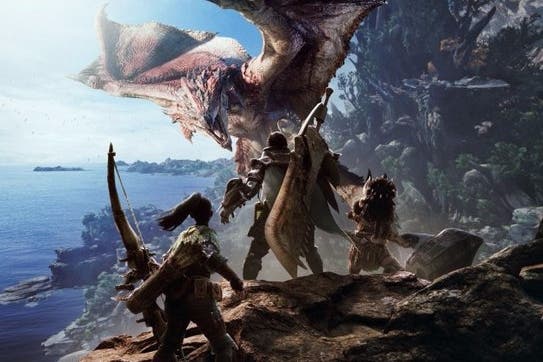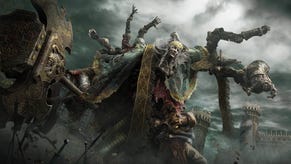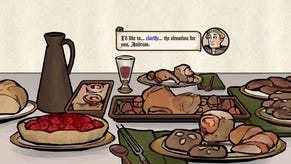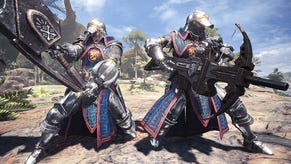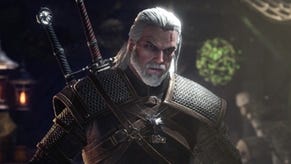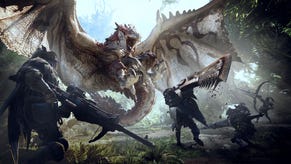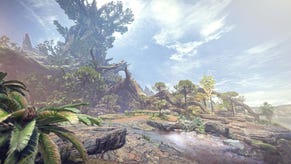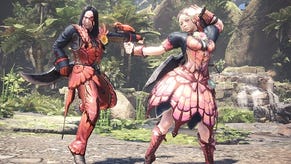Monster Hunter World walkthrough and guide: Story quests, Investigations and Expeditions explained
Our walkthrough of story quests and a guide to how Monster Hunter World's structure works.
Monster Hunter World is the most accessible entry point yet for Capcom's colossally successful action role-playing series, with the series making a big-budget leap to PS4, Xbox One and PC.
But accessibility doesn't mean it has skimped on depth. This is still a vast, detailed and initially overwhelming game, and though things are easier to follow, getting your head around the quest structure and what you can get up to can take a little time - which is where this Monster Hunter World walkthrough and guide comes in.
Monster Hunter World walkthrough
Unlike previous Monster Hunter games, the main 'story' quests are much more obvious to follow.

Instead of being buried amongst a list of other quests, the next mission to progress - allowing you to see new areas and cutscenes - will be either in the Assigned menu of the quest board, or shown as a red symbol on the map screen.
But it's still useful to know what quests and their respective monsters are coming up. The further you progress, the more materials are available to you, and if you know your favourite monster is just an area away, you know exactly when to take an hour out of the story to start farming.
Story missions in chronological order:
Ancient Forest
- Jagras of the Ancient Forest (slay 7 Jagras)
- A Kestodon Kerfuffle (slay Kestodon)
- The Great Jagras Hunt (hunt a Great Jagras)
- Bird-Brained Bandit (hunt a Kulu-Ya-Ka)
- Urgent: Pukei-Pukei Hunt (hunt a Pukei-Pukei)
Wildspire Waste
- The Best Kind of Quest (hunt a Barroth)
- Sinister Shadows in the Swamp (hunt a Jyuratodus)
Ancient Forest revisited
- Flying Sparks: Tobi-Kadachi (hunt a Tobi-Kadachi)
- The Encroaching Anjanath (hunt an Anjanath)
Great Ravine
- One for the History Books (hunt a Zorah Magdaros)
- Expedition (unlock Research Base, Coral Highlands)
Coral Highlands
- Expedition (optional hunt for a Tzitzi-Ya-Ku)
- Ballooning Problems (hunt a Paolumu)
Rotten Vale
- Expedition / Radobaan Roadblock (Sight a Great Gairros, Hunt a Radobaan)
Coral Highlands revisited
- Legiana: Embodiment of Elegance (hunt a Legiana)
Coral Highlands revisited
- Into the Bowels of the Vale (hunt a Odogaron)
Seeking help from a First Wyverian
- Find a First Wyverian in the Ancient Forest (Expedition)
- Horned Tyrant Below the Sands (hunt a Diablos)
- A Fiery Throne Atop the Forest (hunt a Rathalos)
Everstream
- A Colossal Task (hunt a Zorah Magdaros)
Entering High Rank
- Invader in the Waste (started from a Wildspire Waste expedition; hunt a High Rank Pukei-Pukei)
- Find ??? Rathian trails in High Rank Optional quests and expeditions until you research enough to unlock...
- Tickled Pink (hunt a High Rank Anjanath)
- Continue to find ??? Rathian tracks in High Rank Optional quests and expeditions until you research enough to unlock...
- Old World Monster in the New World (hunt a Pink Rathian)
Elder's Recess and Elder Dragons
- Find the three new monsters in Elder's Recess (Expedition)
- Continue to find ??? Nergigante trails in Elder's Recess
- A Wound and a Thirst (slay Nergigante)
- Investigate the three Elder Dragon tracks (complete High Rank quests and find tracks in Ancient Forest, Wildspire Wastes and Rotten Vale)
- Kushala Daora, Dragon of Steel (hunt Kushala Daora)
- Teostra the Infernal (slay Teostra)
- Hellish Fiend Vaal Hazah (slay Vaal Hazah)
- Land of Convergence (slay final boss Xeno'Jiiva)
- ...now enjoy the end credits!
Monster Hunter World guides
As well as the above, here's our other Monster Hunter World guides:
Iceborne guides:
- How to start Monster Hunter World Iceborne
- Monster Hunter World Boaboa quests
- Monster Hunter World Surveyor Set quests
- Monster Hunter World Beotodus strategy and weaknesses
- Monster Hunter World Shara Ishvalda strategy and weaknesses
- How to get Thermae, Yukumo, Silver Knight Layered Armour in Monster Hunter World
Optional monsters:
System explainers:
- Monster Hunter World tips
- Monster Hunter World - How to capture monsters large and small
- Monster Hunter World weapon types list
- Monster Hunter World's Insect Glaive: How Kinsects work
- Monster Hunter World item crafting: How item combinations work
- How to get Layered Armour in Monster Hunter World
Material farming:
- Monster Hunter World Bone locations
- Monster Hunter World Ore locations
- Monster Hunter World - Hornetaur location and how to get Carapace, Innerwing
- Monster Hunter World - Wiggler locations
Tailraider quests:
- Monster Hunter World Grimalkynes and Doodles explained
- Monster Hunter World - How to get the Plunderblade from the Rotten Vale
- Monster Hunter World Gajalaka quests
- Monster Hunter World Boaboa quests
Seasonal events and DLC quests:
- Monster Hunter World Horizon Zero Dawn event and Aloy armour set explained
- Monster Hunter World - Spring Blossom Festival
- Monster Hunter World - Behemoth strategy
- Monster Hunter World - The Witcher quest guide
 7 Things That Scare You About Monster Hunter World But Shouldn't - New Monster Hunter World Gameplay
7 Things That Scare You About Monster Hunter World But Shouldn't - New Monster Hunter World Gameplay
A guide to Monster Hunter World quest types, from Investigations to Expeditions
There is, obviously, much more than Assigned story missions to do, though the way they present themselves isn't exactly obvious.
If you approach the quest board, here's what each mission type means:
- Assigned - This is the next main story mission. Completing these progresses through the story, unlocking new areas, and allows you to fight new monsters.
- Optional - These are optional hunts, arena fights and egg stealing missions. You can either get these from Astera or from quest givers found in Expeditions, or are added automatically, so check back often.
- Investigations - Hunting or Capture quests, usually with failure conditions, but offer better rewards. You can unlock these from the Resource Center (see below). If you want to hunt a specific monster, then this is the place to do it for the added benefits they offer.
- Events - These are time limited missions based around promotions, such as the Horizon Zero Dawn armour set.
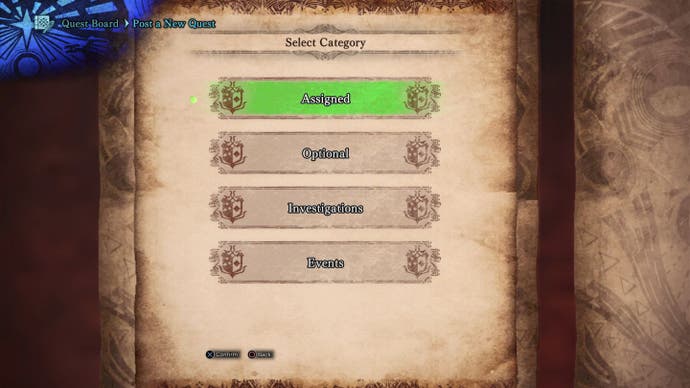
Then there's the Resource Center, which are less to do with hunting monsters:
- Bounties - These are non-monster specific activities for the Research team, such as finding a certain amount of insects or type of item. You'll unlock them from quest givers in Astera or out in Expeditions, such as Grimalkynes.
- Manage Investigations - Select which Investigation missions you want to take on. These update regularly as your Research progresses, so be sure to see what takes your fancy. You can then start them from the quest board, as mentioned above.
- Complete Deliveries - These are similar to Bounties but are more like fetch quests, where you must get a certain amount of items. You'll unlock them from quest givers in Astera or out in Expeditions, and completing them can unlock unique things like new campsites.
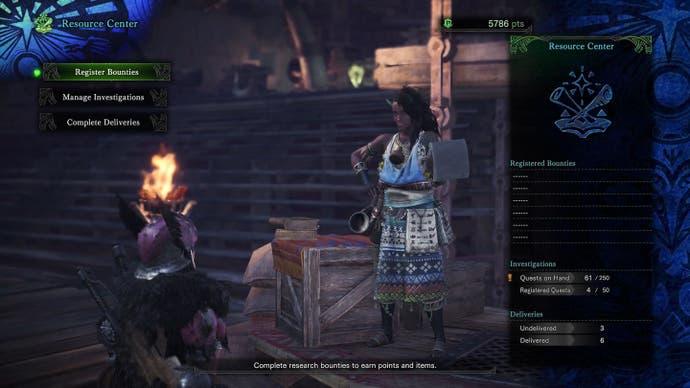
Finally, there are Expeditions, which are selected from the World Map. These allow you to load into any area without having a mission first, allowing you to take your time exploring and foraging. (If you are familiar with Destiny, it's not unlike Patrol missions on a planet.
They also see quest givers appear out in the wild, as well as an opportunity to investigate Grimalkynes.
Though monsters will roam around, you cannot predict which ones will appear, so we recommend choosing Investigations to find a specific creature you need - with the benefit of getting more rewards and Armor Spheres, too.
Monster Hunter World's mission structure is a little confusing, but if you are stuck for things to do outside of the story, head to Astera and Expeditions and hunt for ! marks for bonus quests between missions, and regularly check in to the Resource Center to make sure you don't miss anything.
Monster Hunter World guide: The absolute basics
Monster Hunter is an action role-playing game (RPG), and as the name suggests the core of the game revolves around hunting monsters - large, ferocious beasts that roam the world causing havoc.
As you progress through the game you will be assigned specific targets that you need to track down, but along the way you can take on other prey to collect loot and supplies that can be used to upgrade your weapons and armour to make it easier to take down your quarry.
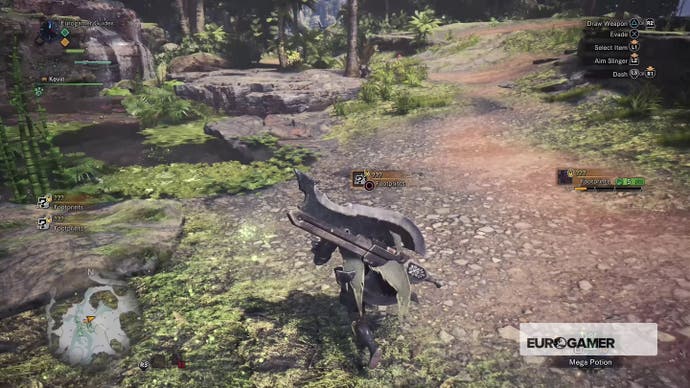
Unlike most RPGs your character has no stats to call their own, and it's all about crafting better gear; if you've ever played Destiny you can think of Monster Hunter being like the endgame, a constant cycle of gear acquisition to let you take on stronger enemies to get better gear to take on stronger enemies.
Quest Structure
Once a quest has started you'll be given a general area to look for the monster's trail, and searching that area will reveal footprints or other evidence of its passing.
Once you have spotted enough of these clues, your Scoutflies - the glowing green breadcrumb trail - will lead you to the monster you've been tasked to kill.
Unless you get lucky, most fights with your prey will be quite lengthy affairs. After taking a chunk of damage the monster will flee, so you'll need to follow it to its new location. You can deal some damage along the way, but it's generally a better strategy to just let it get to where it's going before attacking again - attacking it will slow you down and you're unlikely to be able to do a significant amount of damage to it.
Once the monster reaches its lair it'll stay put. If it's limping and / or sleeping you are able to capture it - otherwise you can continue to scrap it until it's downed.
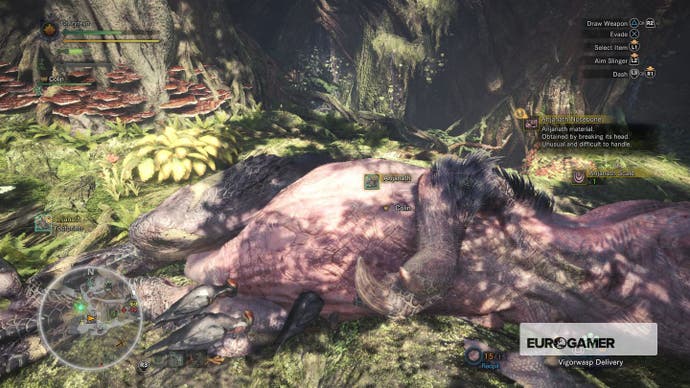
Like Pokémon, if you're defeated in battle you don't die, you just need to have a bit of a lie down, and you will respawn at the nearest camp. Once you wake up follow the trail to resume the fighting - the Scoutflies will generally know the best way. Quests might have a limit on the amount of revives and time, and though by and large you should be able to scrape through, it's worth keeping these in mind.
Once your foe is vanquished you have a brief window to loot it for parts before being returned to the hub.
That's essentially the loop. Of course, there's plenty of nuance to exploring and fighting. Our Monster Hunter World tips page gives you a list of things that aren't obvious outside the essentials.
Making sense of Monster Hunter World's interface
As the game doesn't go into too much detail, it's worth giving a brief explanation of what's going on on your HUD so you can make some sense of the visual noise.
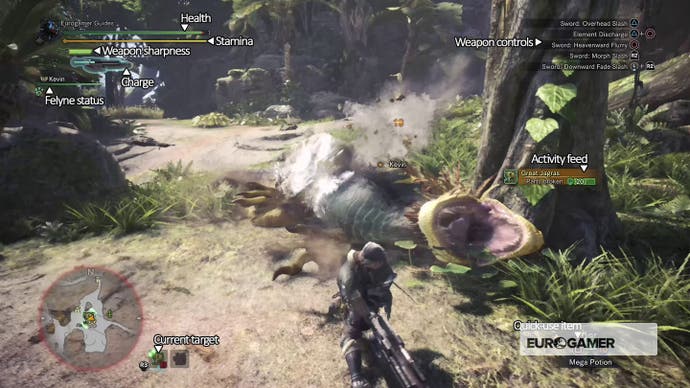
- Health/Stamina: If your health drops to zero you'll faint, and if your stamina drops to zero you'll be pretty much immobilised, so keep an eye on your gauges and get out of trouble if they're looking a little low.
- Weapon Sharpness: (Melee weapons only.) The more you use a melee weapon, the less effective it becomes. Avoid smacking it against rocks, trees, or anything else hard! You can use your Whetstone from the radial menu to sharpen it if it's too damaged, or you can return to camp and swap it for something else.
- Charge: (Varies with weapon type.) If your weapon has elemental attacks or other special features, this gauge will display the level of charge.
- Performing regular attacks will add to the charge, and when the meter's full you can unleash it.
- Felyne Status: Shows the health and special ability status of your Felyne companion. You can't do anything about either of them so it's not entirely useful.
- Weapon Controls: Shows you what attacks are available at that precise moment. It doesn't display combos, though - those you'll have to learn for yourself.
- Activity Feed: Gives a blow-by-blow account of what's going on, showing collected items and other information as you go.
- Quick-use Item: Shows you what item you'll use by pressing Square. Cycle through your inventory with the L1 button.
- Current Target: Displays which target you're tracking, and once an enemy has been engaged it shows their health: the flatter the blue line below the icon, the closer they are to death.
Additional reporting by Mat Hall.
